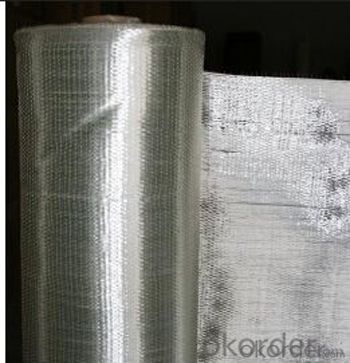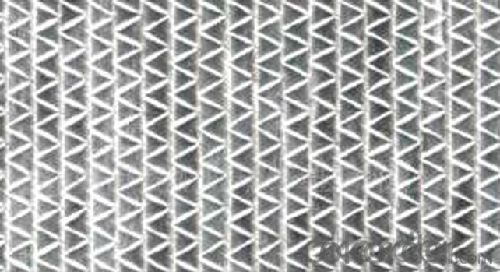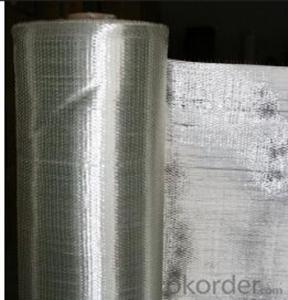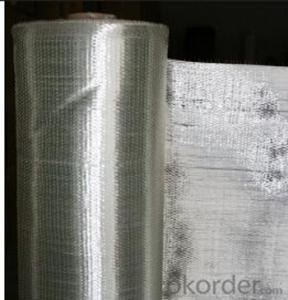Fiberglass Unidirectional Fabric with Density 600gsm Length 1524mm
- Loading Port:
- Shanghai
- Payment Terms:
- TT or LC
- Min Order Qty:
- 2000 kg
- Supply Capability:
- 5000000 kg/month
OKorder Service Pledge
OKorder Financial Service
You Might Also Like
Fiberglass Unidirectional Fabric with Density 600gsm Length 1524mm
Description
Fiberglass unidirectional fabric is the product combining the roving in certain angel of 0 ℃ or 90 ℃ with polyester yarn.
Features
• Fiber straight arranged, fiber strength be ultimately used.
• No powder or emulsion, sink quickly, easy to operate.
• Easy to design, high strength in one direction.
Applications
Mainly be used as reinforced materials in the composite material industry.
• Matrix: unsaturated polyester resin, vinyl ester resin, epoxy resin and phenolic resin etc.
• Craft: winding, pultrusion, hand lay up, etc.
• Ultimate products: storage tank, tube, pultruded profiles, FRP body of boat, etc.
Image:


Features
• Fiber straight arranged, fiber strength be ultimately used.
• No powder or emulsion, sink quickly, easy to operate.
• Easy to design, high strength in one direction.
Applications
Mainly be used as reinforced materials in the composite material industry.
• Matrix: unsaturated polyester resin, vinyl ester resin, epoxy resin and phenolic resin etc.
• Craft: winding, pultrusion, hand lay up, etc.
• Ultimate products: storage tank, tube, pultruded profiles, FRP body of boat, etc.
Specifications
specifications
Fibre type
0°Roving
90°Roving
Overall weight
Width
(g/㎡)
(g/㎡)
(g/㎡)
(mm)
EDW227
E-Glass
—
227
227
1524
EDW350
E-Glass
—
350
350
1524
EDW450
E-Glass
—
450
450
1524
EDJ600
E-Glass
480
120
600
1524
EDJ800
E-Glass
600
200
800
1524
EDJ1000
E-Glass
600
400
1000
1524
Packaging: Wrapped in PVC and placed within a cardboard carton.
FAQ:
1. Why Choose us?
CNBM is a stated own company, provide the guarantee for the best quality, best service and safety business.
2. How will we guarantee the quality?
a, ISO 9001-2008 quality control systempment;
b, Strict and regular quality control in production;
c, Inspeciation when loading into container before ship
d, Sample stock for one year for quality tracing and record.
- Q:Does fiberglass mat tissue require any special curing conditions?
- Yes, fiberglass mat tissue does require special curing conditions. It typically needs to be cured at specific temperature and humidity levels for a specific duration of time in order to achieve optimal strength and performance.
- Q:Can fiberglass mat tissue be used as a reinforcement in concrete?
- Yes, fiberglass mat tissue can be used as a reinforcement in concrete. Fiberglass mat tissue is a thin, lightweight material made from woven fiberglass strands. It is commonly used in construction and industrial applications due to its high strength and durability. When used as reinforcement in concrete, fiberglass mat tissue can help to increase the tensile strength and crack resistance of the concrete. It is typically applied in the form of a mesh or fabric, which is embedded within the concrete during the pouring process. The fiberglass strands in the mat tissue provide additional strength and reinforcement to the concrete, helping to prevent cracking and improve overall structural integrity. This can be particularly beneficial in areas where the concrete is subject to high loads, such as in bridges, concrete slabs, or precast concrete elements. Furthermore, fiberglass mat tissue is corrosion-resistant, which makes it a suitable choice for applications where the concrete is exposed to moisture or chemicals. It does not rust or degrade over time, unlike traditional steel reinforcement, which can help to extend the lifespan of the concrete structure. Overall, fiberglass mat tissue is a viable and effective reinforcement option for concrete. It offers enhanced strength, crack resistance, and corrosion resistance, making it a popular choice in various construction projects.
- Q:Is fiberglass mat tissue suitable for insulation in residential buildings?
- Residential buildings find fiberglass mat tissue to be a suitable option for insulation. This insulation material, made from glass fibers, is commonly used because of its exceptional thermal properties. With a high R-value, it effectively reduces heat transfer, keeping interiors warm in winter and cool in summer. In addition to its thermal efficiency, fiberglass mat tissue is renowned for its durability and long lifespan, making it a reliable choice. It resists moisture, mold, and pests, ensuring a healthy and comfortable living environment. Moreover, its lightweight nature and easy installation process make it efficient and cost-effective for insulation purposes. Moreover, fiberglass mat tissue possesses the crucial feature of being fire-resistant, which is highly desirable for residential buildings. It acts as a protective barrier, preventing the spread of fire and safeguarding occupants and property from potential hazards. Overall, fiberglass mat tissue is a popular and appropriate option for residential insulation due to its thermal efficiency, durability, fire resistance, and easy installation.
- Q:What is the chemical resistance of fiberglass mat tissue?
- The excellent chemical resistance of fiberglass mat tissue stems from the inherent properties of the fiberglass material. Typically, the mat tissue consists of woven or bound glass fibers, forming a protective barrier against a diverse array of chemicals. The glass fibers themselves possess a high resistance to corrosion, rendering fiberglass mat tissue suitable for use in environments where chemical exposure is a concern. The chemical resistance of fiberglass mat tissue can vary based on the specific resin or binder used in the manufacturing process. Various types of resins may offer superior resistance to certain chemicals, while others may be more susceptible to degradation. It is crucial to consider the specific chemicals that will come into contact with the fiberglass mat tissue and choose a compatible resin or binder accordingly. In general, fiberglass mat tissue is renowned for its ability to withstand acids, alkalis, solvents, and other commonly found industrial and commercial chemicals. It can endure exposure to a wide range of corrosive substances, making it a versatile and long-lasting material for various applications. Nevertheless, it is important to note that prolonged exposure to highly concentrated or aggressive chemicals may eventually result in some degradation or deterioration of the fiberglass mat tissue. Therefore, it is imperative to consult the manufacturer's specifications and guidelines to ensure proper chemical compatibility and performance in specific environments.
- Q:What is the maximum temperature that fiberglass mat tissue can withstand?
- The maximum temperature that fiberglass mat tissue can withstand depends on the specific type of fiberglass material being used. Generally, most fiberglass mat tissues are designed to withstand temperatures up to 600 degrees Fahrenheit (315 degrees Celsius). However, it is important to note that the temperature tolerance can vary depending on factors such as the thickness of the material, the manufacturing process, and the specific application. It is always advisable to consult the manufacturer's specifications or technical data sheets for accurate information regarding the maximum temperature resistance of a particular fiberglass mat tissue.
- Q:How does fiberglass mat tissue compare to fiberglass mesh?
- Fiberglass mat tissue and fiberglass mesh serve different purposes and exhibit distinct characteristics. Fiberglass mat tissue, a lightweight and flexible material, finds common use in the production of fiberglass-reinforced plastics (FRP). It is created by randomly dispersing glass fibers onto a mesh or non-woven fabric, which is then bonded with resin. This yields a material with a smooth surface and higher tensile strength compared to fiberglass mesh. Its exceptional strength and stiffness make it an ideal choice for applications that necessitate structural reinforcement, such as automotive parts, boat hulls, and wind turbine blades. Conversely, fiberglass mesh is a woven fabric composed of continuous glass fibers. With its open mesh structure, it facilitates better resin penetration and adhesion. Fiberglass mesh is frequently employed to reinforce surfaces like concrete, stucco, and drywall. It offers excellent crack resistance, dimensional stability, and impact resistance. In construction and renovation projects, fiberglass mesh proves particularly valuable as it reinforces surfaces and prevents cracking. In conclusion, fiberglass mat tissue is better suited for applications requiring structural reinforcement and strength, like FRP production. Its smooth surface and high tensile strength set it apart. On the other hand, fiberglass mesh is commonly used in construction projects to reinforce surfaces and prevent cracking. Its open mesh structure allows for improved resin penetration and adhesion. Ultimately, the choice between fiberglass mat tissue and fiberglass mesh depends on the specific requirements of the application at hand.
- Q:Can fiberglass mat tissue be used for insulation in oil refineries?
- Yes, fiberglass mat tissue can be used for insulation in oil refineries. It is commonly used due to its excellent thermal insulation properties, resistance to high temperatures, and resistance to chemical corrosion.
- Q:Can fiberglass mat tissue be used for repairing fiberglass tanks?
- Yes, fiberglass mat tissue can be used for repairing fiberglass tanks. Fiberglass mat tissue is a thin, flexible material that is commonly used in the construction and repair of fiberglass products. It is designed to provide reinforcement and strength to the repaired areas. When applied with an appropriate resin, fiberglass mat tissue can effectively repair cracks, holes, or damaged sections of fiberglass tanks. However, it is important to ensure that the repair is done in a proper and professional manner, following the manufacturer's instructions and guidelines. Additionally, it is recommended to consult with an expert or specialist in fiberglass repair to ensure the best possible outcome for the repair.
- Q:Can fiberglass mat tissue be used for reinforcing fiberglass pools?
- Fiberglass mat tissue is indeed suitable for reinforcing fiberglass pools. This product, known for its thin and flexible nature, is widely utilized in the construction and repair of fiberglass structures, including pools. Comprising delicate glass fibers bonded together with a binder, the mat tissue offers added strength and reinforcement when applied to the pool's surface. By doing so, it effectively prevents cracks and damage. Typically, it is used in conjunction with fiberglass resin, which acts as an adhesive to securely attach the mat tissue to the pool surface. The practice of utilizing fiberglass mat tissue for reinforcing fiberglass pools is widely adopted, as it significantly increases the pool's lifespan and durability.
- Q:Can fiberglass mat tissue be used for mold-making?
- Typically, fiberglass mat tissue is not used for mold-making. This lightweight material is made up of randomly oriented glass fibers that are bonded together with a binder. It is commonly utilized in the insulation, construction, and automotive industries for reinforcement purposes. When it comes to mold-making, other materials like silicone, latex, or polyurethane are more commonly employed. These materials possess the necessary properties to create molds that are flexible and capable of reproducing intricate details accurately. Moreover, they are user-friendly and can be poured or brushed onto the original object to form a mold. Conversely, fiberglass mat tissue lacks the flexibility and accuracy required for mold-making. It is not designed to easily conform to complex shapes or capture fine details. Additionally, it may not provide the desired level of flexibility needed to safely remove the original object from the mold without causing damage. Therefore, it is advisable to utilize specific mold-making materials that are specifically designed for this purpose instead of attempting to employ fiberglass mat tissue.
1. Manufacturer Overview |
|
|---|---|
| Location | |
| Year Established | |
| Annual Output Value | |
| Main Markets | |
| Company Certifications | |
2. Manufacturer Certificates |
|
|---|---|
| a) Certification Name | |
| Range | |
| Reference | |
| Validity Period | |
3. Manufacturer Capability |
|
|---|---|
| a)Trade Capacity | |
| Nearest Port | |
| Export Percentage | |
| No.of Employees in Trade Department | |
| Language Spoken: | |
| b)Factory Information | |
| Factory Size: | |
| No. of Production Lines | |
| Contract Manufacturing | |
| Product Price Range | |
Send your message to us
Fiberglass Unidirectional Fabric with Density 600gsm Length 1524mm
- Loading Port:
- Shanghai
- Payment Terms:
- TT or LC
- Min Order Qty:
- 2000 kg
- Supply Capability:
- 5000000 kg/month
OKorder Service Pledge
OKorder Financial Service
Similar products
New products
Hot products
Related keywords





























